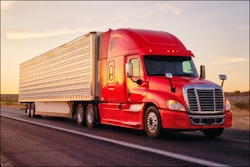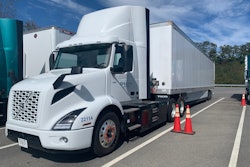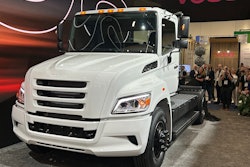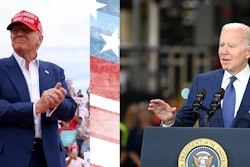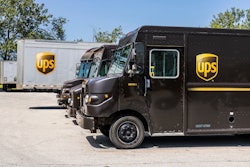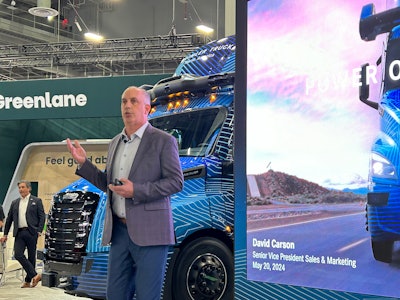
Batteries don't last forever, and what to do with them once they near end-of-life has has been a burning question on trucking's path to zero emissions. At the Advanced Clean Transportation (ACT) Expo in Las Vegas Monday, Daimler Truck North America (DTNA) announced it was throwing truck batteries a lifeline, literally.
Batteries are "the most important and most expensive part of an electric vehicle," said DTNA Senior Vice President of Sales and Marketing David Carson, yet when they're no longer a viable part of the drivetrain, they're essentially worthless and useless to the operator. The "second life" program DTNA unveiled Monday removes those concerns with a focus on repairing, remanufacturing, repurposing, and recycling the lithium-ion battery materials used in all DTNA battery electric trucks.
"We’re not just focused on the life cycle of the battery within the utilization of the truck," Carson said.
DTNA's plan is to not only to maximize the life span of a battery, but also reduce waste. Carson added that DNTA telemetry technology can detect when the truck's batteries dip below vehicle-use standards and determine the next steps. Repair, if that is possible, gets priority consideration.
Remanufacturing
When a battery or electric vehicle component is beyond repair, it enters the remanufacturing process at existing Detroit Diesel Remanufacturing locations across the U.S., with intended reuse in vehicles. This process involves partial disassembly, module replacement and rigorous testing for optimized reliability. All remanufactured products are updated with the latest technology and must meet or exceed new product standards to be reintroduced to the market.
Repurposing
DTNA has partnered with Nuvation Energy to pilot a battery energy storage system (BESS) designed to assist in charging, peak shaving, backup storage and microgrid scenarios. This solution enables DTNA to repurpose batteries that cannot be reused in a vehicle. Carson said DTNA’s first battery energy storage system units, designed by Nuvation Energy using Detroit battery modules, will be placed at its Electric Island later this year. Battery energy storage systems , he said, play a pivotal role in the electric vehicle ecosystem, given the escalating demand for charging infrastructure and limitations of the current power grid. As the number of EVs on the road increases, the existing grid capacity may struggle to meet charging demands. Energy storage systems alleviate this issue by facilitating off-peak charging, utilizing stored power when needed, and reducing reliance on the grid.
Recycling
DTNA has created a process in partnership with Li-Cycle, a leading lithium-ion battery resource recovery company, to recycle critical battery-grade materials for batteries that reach the end of their life cycle. Li-Cyle uses an environmentally friendly and safe method that recycles batteries within a liquid-based solution, achieving up to a 95% recovery rate for returning critical materials back to the battery supply chain while producing minimal water discharge.


